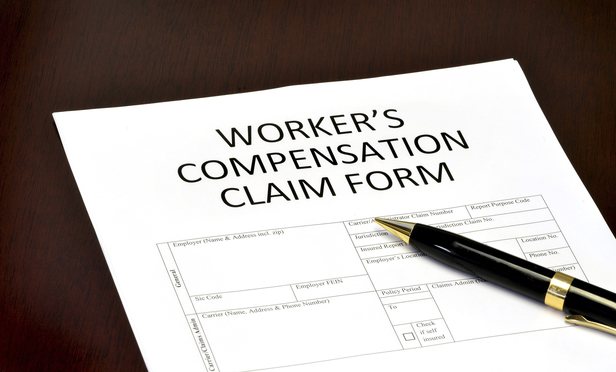Christian Petrucci

June 03, 2015 | The Legal Intelligencer
'Prompt Written Notice' Only Applies to Current Benefits RecipientsLast month, in the matter of , No. 34 EAP 2014, the Supreme Court of Pennsylvania addressed the employers' notice requirement of Section 306(b)(3) of the Workers' Compensation Act as it pertains to a denied claim. The purpose of Section 306(b)(3) is to compel the employer to share with the injured worker any new medical information about a claimant's physical capacity to work and its possible impact on existing benefits so a claimant will be put on notice that there was a physical change in his or her condition that obligated the claimant to look for available work.
By Christian Petrucci
7 minute read

May 07, 2015 | The Legal Intelligencer
Pa. Supreme Court's Perplexing Decision on SubrogationLast week, the Pennsylvania Supreme Court rendered its long-awaited decision in Liberty Mutual Insurance v. Domtar Paper, No. 19 WAP 2014. The court had taken up the case from the Superior Court to determine whether Section 319 of the Pennsylvania Workers' Compensation Act confers on employers or their workers' compensation insurance carriers a right to pursue their subrogation interests directly against a third-party tortfeasor when the claimant in the workers' compensation matter takes no action against the third-party tortfeasor.
By Christian Petrucci
8 minute read

May 07, 2015 | The Legal Intelligencer
Pa. Supreme Court's Perplexing Decision on SubrogationLast week, the Pennsylvania Supreme Court rendered its long-awaited decision in , No. 19 WAP 2014. The court had taken up the case from the Superior Court to determine whether Section 319 of the Pennsylvania Workers' Compensation Act confers on employers or their workers' compensation insurance carriers a right to pursue their subrogation interests directly against a third-party tortfeasor when the claimant in the workers' compensation matter takes no action against the third-party tortfeasor.
By Christian Petrucci
8 minute read

April 29, 2015 | The Legal Intelligencer
Workers' Compensation 'Reform' Unnecessary After Rate CutAfter years of being threatened with wholesale changes to Pennsylvania's workers' compensation law, driven largely by the Chamber of Commerce and a perception that insurance costs are out of control, it appears that a respite is warranted. In March, the Wolf administration announced a significant rate cut in workers' compensation insurance, while maintaining benefit levels for injured workers. Therefore, the impetus for imposing draconian reform to the system would seem to no longer exist—if it ever did.
By Christian Petrucci
6 minute read

April 28, 2015 | The Legal Intelligencer
Workers' Compensation 'Reform' Unnecessary After Rate CutAfter years of being threatened with wholesale changes to Pennsylvania's workers' compensation law, driven largely by the Chamber of Commerce and a perception that insurance costs are out of control, it appears that a respite is warranted. In March, the Wolf administration announced a significant rate cut in workers' compensation insurance, while maintaining benefit levels for injured workers. Therefore, the impetus for imposing draconian reform to the system would seem to no longer exist—if it ever did.
By Christian Petrucci
6 minute read

March 05, 2015 | The Legal Intelligencer
The Threat of a Tax on Legal Services Returns in PennsylvaniaJust when you thought it was safe to practice law without the specter of becoming a taxing conduit of the government looming, our new governor, Tom Wolf, has begun production on Tax on Legal Services II.
By Christian Petrucci
5 minute read

March 05, 2015 | The Legal Intelligencer
The Threat of a Tax on Legal Services Returns in PennsylvaniaJust when you thought it was safe to practice law without the specter of becoming a taxing conduit of the government looming, our new governor, Tom Wolf, has begun production on Tax on Legal Services II.
By Christian Petrucci
5 minute read

February 05, 2015 | The Legal Intelligencer
Determining When Maximum Medical Improvement Is ReachedThere is, perhaps, no other section of the Workers' Compensation Act that has been under greater scrutiny by the appellate courts than Section 306(a.2), dealing with impairment rating evaluations (IREs). Of course, the IRE, which was to have much greater significance in the Pennsylvania workers' compensation practice than it does, is used by the employer to determine the percentage of "permanent impairment" an injured worker suffers following the receipt of 104 weeks of total disability benefits. In the event an injured worker's "whole body impairment" is determined by an IRE to be less than 50 percent according to the American Medical Association Guides to the Evaluation of Permanent Impairments, a claimant's benefits can shift from total to partial in nature, without changing the amount of compensation paid.
By Christian Petrucci
7 minute read

February 04, 2015 | The Legal Intelligencer
Determining When Maximum Medical Improvement Is ReachedThere is, perhaps, no other section of the Workers' Compensation Act that has been under greater scrutiny by the appellate courts than Section 306(a.2), dealing with impairment rating evaluations (IREs). Of course, the IRE, which was to have much greater significance in the Pennsylvania workers' compensation practice than it does, is used by the employer to determine the percentage of "permanent impairment" an injured worker suffers following the receipt of 104 weeks of total disability benefits. In the event an injured worker's "whole body impairment" is determined by an IRE to be less than 50 percent according to the American Medical Association Guides to the Evaluation of Permanent Impairments, a claimant's benefits can shift from total to partial in nature, without changing the amount of compensation paid.
By Christian Petrucci
7 minute read

January 08, 2015 | The Legal Intelligencer
Commonwealth Ct. Defers to High Court on Abnormal Working ConditionsAt the end of last year, the Commonwealth Court decided the matter of Pennsylvania Liquor Control Board v. Workers' Compensation Appeal Board (Kochanowicz), No. 760 C.D. 2010, which it received on remand from the state Supreme Court after its prior decision in the case was vacated. The court was directed to reconsider the matter in light of the prior Supreme Court decision in Payes v. WCAB (Commonwealth of Pennsylvania State Police), 79 A.3d 543 (Pa. 2013), decided just over a year ago. The Supreme Court in Payes had taken the lower appellate tribunals to task for the manner in which they had been dealing with work-related psychological injuries—often substituting their own findings for those of the trial court. The case restored the appropriate power to the fact-finder in "mental-mental" psychiatric work injury claims, or those stemming from nonphysical stimuli.
By Christian Petrucci
6 minute read
More from ALM
- Scan In Progress: Litigators Leverage AI to Screen Prospective Jurors 1 minute read
- Legal Speak at General Counsel Conference East 2024: Match Group's Katie Dugan & Herrick's Carol Goodman 1 minute read
- Legal Speak at General Counsel Conference East 2024: Eric Wall, Executive VP, Syllo 1 minute read



